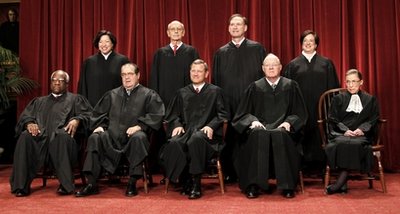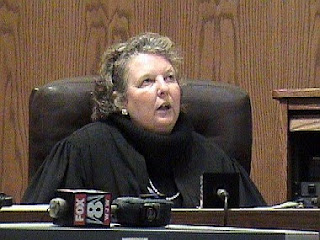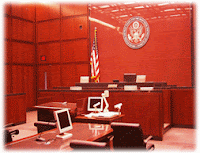Former Illinois governor Rod Blagojevich will go on trial, for the second time, April 20, 2011. That's four months later than was originally planned.
Blago's attorneys, Sheldon Sorosky and Aaron Goldstein, had asked for a delay because they said they needed more time to prepare. The original defense team went from five senior lawyers, two junior lawyers, a bunch of paralegals and legal assistants for the first trial...to just two lawyers and maybe a paralegal, for the re-trial. The flamboyant Sam Adam and Sam Adam junior are out. The legal team was reduced because Blago is broke, which means taxpayers will have to come up with the cash for his defense. Judge James Zagel is limiting that cost by only allowing the two attorneys.
It may seem to the public like the same trial all over again for Blago, accused of trying to sell Barack Obama's former senate seat, but even judge Zagel agreed that "its a different universe" this time, because lawyers learned some new tricks from the first time around and may choose to call different witnesses.
The first trial garnered national attention, as Blago, who made his way around reality shows and talk shows, was found guilty on only one of 24 counts related to trying to sell an Illinois senate seat. That one count was for lying to the feds about it.
JUSTICE WILL BE SERVE

The Supreme Court Justices of the United States sit for a formal group photo in the East Conference Room of the Supreme Court in Washington on October 8, 2010. The Justices are (front row from left) Clarence Thomas, Antonin Scalia, John G. Roberts (Chief Justice), Anthony Kennedy, Ruth Bader Ginsburg; (back row from left) Sonia Sotomayor, Stephen Breyer, Sameul Alito and Elena Kagan, the newest member of the court. On my web page I'm going to be talking about Judges. Juvenile Judges and Criminal Judges and Supreme Court Judges I think they are the best. They do anything and mostly everything they want. Most importantly, they are fair in all ways. I'm going to be giving u updates of Judges and how the judicial system work. Trust me it's not like T.V Judges it's a whole different thing.
Thursday, November 25, 2010
Saturday, November 20, 2010
Monday, October 4, 2010
Justice Elena Kagan Made It!!!!!!!!!!!!!!!!!!!!!!!!!!!!!!!!!!1
Here is Justice Elena Kagan and Chief Justice John Roberts at a ceremony in the Supreme Court to celebrate Justice Kagan nomination to the bench. Justice Kagan begin her term today.
Friday, September 24, 2010
THE SHERIFF DID WRONG
COLUMBIA — U.S. Magistrate Judge Joseph R. McCrorey has set a $200,000 bond for former Lee County sheriff Edgar Jerome “E.J.” Melvin, who will be on house arrest with an electronic monitoring device upon his release, after finding probable cause Wednesday afternoon for the charges against him.
Melvin, who had served as sheriff since 2001, and eight others were arrested Saturday and charged with conspiracy to possess with intent to distribute five kilograms or more of powder cocaine and 50 grams or more of crack cocaine since 2006.
Monday, August 30, 2010
Thursday, August 19, 2010
Monday, August 16, 2010
Justice Elena Kagan
Sunday, August 15, 2010
U.S District Federal Judge Susan Bolton

PHOENIX - U.S. District Judge Susan Bolton will be deciding the fate of Arizona's immigration law. Many that know her and have tried cases before her say she is tough but impartial.
Judge Bolton how has six lawsuits against the state to decide -- that includes the federal government's challenge.
This is what we found out about her. Bolton was a Superior Court judge in Maricopa County for 11 years, between 1989 and 2000. She is well regarded among both Democrats and Republicans.
In 2000, she was recommended by Arizona Senator Jon Kyl, a Republican, for the federal bench. And she was nominated by then-President Clinton.
Some who have reported on Judge Bolton's cases expect her to be fair and thorough.
"She's thought of as very thoughtful, she also seems to be willing to work under a tight schedule, which given the July 29th date for this law to take effect is going to be critical," says Howard Fischer with Capitol Media Services.
But Judge Bolton is before the law and is set to take in effect. She is scheduled to hear the first of six lawsuits against the law on July 15. Judge Susan Bolton block controversial parts of Arizona immigration law. Great Seal of the State of Arizona Image via Wikipedia. Today’s ruling by Judge Bolton prevents police officers check the immigration status of a person, while other laws imposed. It has the features, the immigrants in their documentation practice that require to identify themselves blocked. Hearing the arguments of lawyers from the Department of Justice, ACLU and the defendants, the State of Arizona: “Today, a stay led to enact before any further hearings, decide on the total bill will be.
Rod Blagojevich Federal Charges "will he walk"
 COUNTS: Racketeering (Count 1); conspiracy to commit racketeering (Count 2), wire fraud (Counts 3, 4, 5, 6, 7. 8, 9, 10, 11, 12, and 13); attempted extortion (Counts 14, 15, 19, and 22); conspiracy to commit extortion (Counts 17 and 21); bribery (Counts 16 and 20); conspiracy to commit bribery (Counts 18 and 23); and making false statements to the government (Count 24) he also charge with trying to give away the president Barack Obama seat to another senate without consent.
COUNTS: Racketeering (Count 1); conspiracy to commit racketeering (Count 2), wire fraud (Counts 3, 4, 5, 6, 7. 8, 9, 10, 11, 12, and 13); attempted extortion (Counts 14, 15, 19, and 22); conspiracy to commit extortion (Counts 17 and 21); bribery (Counts 16 and 20); conspiracy to commit bribery (Counts 18 and 23); and making false statements to the government (Count 24) he also charge with trying to give away the president Barack Obama seat to another senate without consent.Saturday, July 17, 2010
WHAT HAPPENS AT A TRIAL

WHAT HAPPENS AT A ARRAIGNMENT

3. This proceeding is called an arraignment. The principal purpose of arraignment is for you to enter a plea to the charges. Before taking your plea, I will advise you of your rights and options. I will advise you of the offense(s) you are charged with and will give you a copy of the criminal complaint or citation if you do not already have one. At that point, you will enter a plea to the charges.
4. You have the right to:
* Plead not guilty;
* A trial on the charge(s);
* Be released on bail, if you are still in custody;
* The assistance of an attorney at all stages of the case. If you cannot afford to hire an attorney, the court may appoint an attorney to represent you if you qualify for such representation.
* See and hear the witnesses at trial and to cross-examine them or ask them questions;
* To present evidence in your own behalf;
* To have the court issue subpoenas for you directing your witnesses to be in court for trial and to testify;
* To remain silent and not be forced to incriminate yourself. That means that you are never required to testify. And,
* To be presumed innocent until the prosecution proves your guilt beyond a reasonable doubt. You are not required to prove anything. The prosecution must prove the charge(s) and must do so beyond a reasonable doubt if the case goes to trial.
5. Do you understand these rights? Do you have any questions about these rights? [If the court is uncertain that the defendant understands any of these rights, the court may ask the defendant to explain what had just been stated: e.g. “Could you please explain to me how you understand what I have just told you? I want to be certain that you are clear about what I have said.”]
6. [If the defendant does not have counsel, you must determine whether the defendant is entitled to court-appointed counsel. ]
Do you understand that you have the right to have an attorney represent you and that if you cannot afford an attorney, one may be appointed for you if you qualify for such representation?
[If no, rephrase the question.]
[If yes, ask]: Can you afford to hire an attorney or consult with an attorney for advice?
[If yes, determine whether the defendant wants an attorney]: Do you want to hire or consult with an attorney?
[If yes, reset the arraignment for a week later to allow the defendant a reasonable opportunity to hire an attorney or consult an attorney for advice.]
[If no, determine whether the defendant is making a knowing, intelligent, and voluntary waiver of counsel by asking the following questions]:
* Do you understand that if you are convicted you may be sentenced to jail?
* Do you understand the consequences of waiving counsel?
* Is your decision to waive counsel made voluntarily, without threats or coercion?
* Do you wish to waive your right to an attorney and represent yourself?
[If yes to all questions, have the defendant sign a Waiver of Counsel form, Criminal Form 9-401A, and continue with the arraignment.]
[If no, ask]: Do you wish to request a court-appointed attorney?
[If yes, you must make an indigency determination and appoint counsel if indigent.]
[If no, you must determine whether the defendant is making a knowing, intelligent, and voluntary waiver of counsel by asking the following questions]:
* Do you understand that if you are convicted you may be sentenced to jail?
* Do you understand the consequences of waiving counsel?
* Is your decision to waive counsel made voluntarily, without threats or coercion?
* Do you wish to waive your right to an attorney and represent yourself?
[If yes to all questions, have the defendant sign a Waiver of Counsel form, Criminal Form 9-401A, and continue with the arraignment.]
7. Have you received a copy of the criminal complaint or citation? [If no, provide the defendant a copy.]
8. You are charged with .
[Read the ordinance(s) aloud.]
9. Do you understand the charge(s)?
10. [NOTE: If the charge is DWI or Aggravated DWI, you must inform the defendant of the maximum and mandatory minimum penalties for a first, second, and third offense
Thursday, July 15, 2010
GUN RIGHT LAW NOW IN ILLNOIS !!!

Alderman Rey Colon, whose brother was fatally shot in 1979, said the justices on the nation's top court didn't understand the reality of the inner city. "I understand the right to bear arms, but I also understand parents crying in their sleep," he said.
On Monday the high court overturned 19th century rulings that said the 2nd Amendment restricted only federal gun laws, not local or state measures. In a 5-4 decision, the justices said the right to have a handgun for self-defense is "fundamental from an American perspective [and] applies equally to the federal government and the states."
It will be 10 days before the new ordinance becomes city law. Then anyone who wants to get a handgun must obtain a Chicago firearm permit.
People who have committed violent crimes, or have two or more convictions for driving under the influence of alcohol or drugs, will not be allowed permits.
Key provisions of the ordinance:
•Firearm sales will be banned in the city.
•Gun training totaling four hours in a classroom and an hour on a firing range will be required before getting a permit. But firing ranges are banned, so training must be completed outside Chicago.
•To transport a gun, it will have to be "broken down," not immediately accessible, unloaded, and in a firearm case.
•Firearms may be possessed only inside the dwelling. It will be illegal to have a gun in the garage, on the front porch or in the yard. Guns also will not be allowed in hotels, dorms and group-living facilities
On Monday the high court overturned 19th century rulings that said the 2nd Amendment restricted only federal gun laws, not local or state measures. In a 5-4 decision, the justices said the right to have a handgun for self-defense is "fundamental from an American perspective [and] applies equally to the federal government and the states."
It will be 10 days before the new ordinance becomes city law. Then anyone who wants to get a handgun must obtain a Chicago firearm permit.
People who have committed violent crimes, or have two or more convictions for driving under the influence of alcohol or drugs, will not be allowed permits.
Key provisions of the ordinance:
•Firearm sales will be banned in the city.
•Gun training totaling four hours in a classroom and an hour on a firing range will be required before getting a permit. But firing ranges are banned, so training must be completed outside Chicago.
•To transport a gun, it will have to be "broken down," not immediately accessible, unloaded, and in a firearm case.
•Firearms may be possessed only inside the dwelling. It will be illegal to have a gun in the garage, on the front porch or in the yard. Guns also will not be allowed in hotels, dorms and group-living facilities
Tuesday, June 22, 2010
Monday, June 21, 2010
JUDGE BELVIN PERRY JR.

The defense has filed a reply dealing with the death penalty motion and want the judge to denied the motion of the death penalty says that the state attorney are doing to much and not proving beyond a reasonable doubt . The attorney meeting with judge for a status hearing. Defense attorney want to exclude the 911 call for Casey mother.
THIS CASE IS ON CASEY ANTHONY'S
Saturday, June 19, 2010
JUDGE TINA S.
JUDGE CHRISTEN

Yesterday, Governor Sarah Palin announced the appointment of Anchorage Superior Court Judge Morgan Christen to the high court in Alaska. Judge Christen will be just the second woman named to the high court in the 50 years since statehood. Some will emphasize the Sarah Palin angle of this story, because of differences between Christen's social values and Palin's. But to me, that is not the big part of the story. The big part of the story is that even in a state with a relatively small population, there was a woman jurist about whom any Governor, regardless of her or his own ideology, could say would make an outstanding state Supreme Court judge
JUDGE TIMOTHY

Cuyahoga County Common Pleas Judge Timothy J. McGinty stepped down Thursday from hearing the multiple murder trial of Anthony Sowell -- citing a potential conflict with his own well-known efforts to reform criminal justice practices.
McGinty said in a one-paragraph letter to Administrative Judge Eileen Gallagher that his own "public policy reform efforts" might lead to a conflict in hearing the high-profile trial.
Sowell had pleaded not guilty by reason of insanity to 11 counts of aggravated murder and other charges last week after police investigators in October found the remains of 11 women at his Imperial Avenue home.
A new judge will get the case today, Gallagher said. She said she accepted McGinty's recusal from the case as standard procedure when any judge claims a conflict.
JUSTICE WILL BE SERVE !!!!!!!!!!!

Hello!!! on my web page I'm going to be talking about judges. Federal Judges I think they are the best. They do anything and mostly everything they want. Most importantly, they are fair in all ways. I'm going to be giving u updates of Judges and how the judicial system work. Trust me it's not like T.V Judges it's a whole different thing.
Subscribe to:
Comments (Atom)









